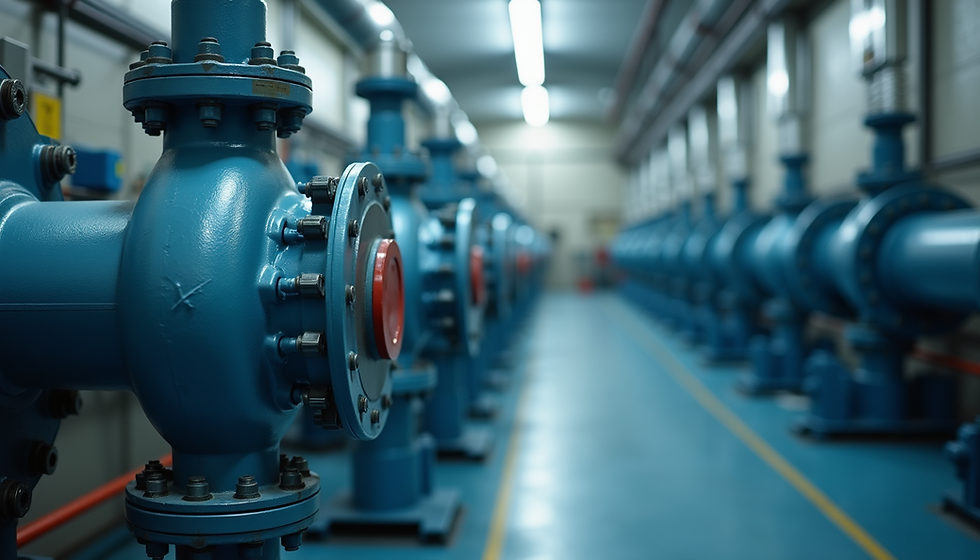Unlocking the Future of Water Management
- Sep 22, 2025
- 3 min read
Water is the lifeblood of industry. Managing it efficiently is no longer optional - it is essential. Industrial water treatment facilities face increasing pressure to optimize operations, reduce costs, and minimize downtime. The key lies in adopting sustainable water management solutions that leverage cutting-edge technology and smart strategies. In this post, I will explore how the water industry is evolving, the role of sustainability, and practical steps to unlock the future of water management.
Embracing Sustainable Water Management Solutions
Sustainability is more than a buzzword. It is a necessity for industrial water treatment. Facilities consume vast amounts of water and energy, and waste management is a constant challenge. Sustainable water management solutions focus on reducing environmental impact while improving operational efficiency.
Some practical approaches include:
Water reuse and recycling: Treating wastewater on-site to reuse in processes reduces freshwater demand.
Energy-efficient treatment technologies: Using advanced membranes, UV disinfection, and optimized aeration cuts energy consumption.
Real-time monitoring and control: Sensors and AI platforms provide instant data to adjust processes and prevent failures.
Chemical optimization: Reducing chemical use through precise dosing and alternative treatments lowers costs and pollution.
These solutions not only protect resources but also improve reliability and reduce operational expenses. For example, implementing a membrane bioreactor system can reduce sludge production and energy use simultaneously.

How Technology Drives Sustainable Water Management
Technology is the backbone of modern water management. The integration of AI, IoT, and data analytics transforms how facilities operate. AI-powered platforms analyze vast amounts of sensor data to predict equipment failures, optimize chemical dosing, and adjust treatment parameters in real time.
One standout example is the Quantaro platform by VersaSolution. It empowers engineers with actionable insights, enabling proactive maintenance and process optimization. This reduces downtime and cuts costs significantly.
Key technological benefits include:
Predictive maintenance: AI detects early signs of equipment wear or malfunction.
Process optimization: Algorithms fine-tune treatment steps for maximum efficiency.
Remote monitoring: Engineers can oversee multiple sites from a single dashboard.
Data-driven decision making: Historical and real-time data guide strategic improvements.
By embracing these technologies, facilities can meet stricter environmental regulations and improve sustainability without sacrificing performance.

What is the future of the water industry?
The water industry is on the brink of transformation. Traditional methods are giving way to smart, integrated systems that prioritize sustainability and efficiency. The future will see:
Increased automation: Robotics and AI will handle routine tasks and complex analyses.
Circular water economies: Facilities will treat and reuse water continuously, minimizing waste.
Decentralized treatment: Smaller, modular plants will serve localized needs, reducing infrastructure costs.
Enhanced collaboration: Data sharing between facilities and regulators will improve compliance and innovation.
These trends will redefine how water is managed industrially. Engineers will play a critical role in designing, implementing, and maintaining these advanced systems.

Practical Steps to Implement Sustainable Water Management Solutions
Transitioning to sustainable water management requires a clear plan and commitment. Here are actionable recommendations:
Conduct a water audit: Identify where water is used, lost, or wasted.
Set measurable goals: Define targets for water reduction, energy savings, and waste minimization.
Invest in technology: Adopt AI platforms like Quantaro for real-time monitoring and predictive analytics.
Train staff: Ensure engineers and operators understand new systems and sustainability principles.
Collaborate with experts: Partner with solution providers who specialize in industrial water management.
Monitor and adjust: Use data to continuously improve processes and meet goals.
By following these steps, facilities can unlock significant operational and environmental benefits.
Looking Ahead: The Path to Smarter Water Management
The future of water management is bright but demands action. Industrial water treatment facilities must embrace innovation and sustainability to thrive. AI-powered platforms, smart sensors, and sustainable practices will become standard tools in the engineer’s arsenal.
VersaSolution’s Quantaro platform exemplifies this shift, offering a powerful way to optimize operations, reduce downtime, and cut costs. The journey to smarter water management is ongoing, but the benefits are clear: improved efficiency, reduced environmental impact, and stronger resilience.
The time to act is now. Unlocking the future of water management means investing in sustainable solutions today for a cleaner, more efficient tomorrow.
.png)



Comments